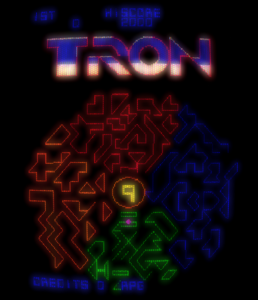 The Game: Think of it as Scrabble without the board. A random selection of letters flashes past (or marches past, depending on your chosen game variation), leaving it up to you to press the fire button and stop them in your tracks. At that moment, you have a limited amount of time to fashion a word from as many of the letters on screen as possible; scoring depends on the standard Scrabble value of each letter. You can either pass on doing anything with the selection of letters you end up with (resulting in no points), or you can enter your word, which gives you (or another player) a chance to approve or disqualify the word depending on whether or not it’s a real word according to the dictionary. (Selchow & Righter, 1983)
The Game: Think of it as Scrabble without the board. A random selection of letters flashes past (or marches past, depending on your chosen game variation), leaving it up to you to press the fire button and stop them in your tracks. At that moment, you have a limited amount of time to fashion a word from as many of the letters on screen as possible; scoring depends on the standard Scrabble value of each letter. You can either pass on doing anything with the selection of letters you end up with (resulting in no points), or you can enter your word, which gives you (or another player) a chance to approve or disqualify the word depending on whether or not it’s a real word according to the dictionary. (Selchow & Righter, 1983)
Memories: One of the rarest cartridges in the Atari 2600’s library, Glib is one of those oddities from the tail end of the era when anyone and everyone was turning out Atari games – even outfits like Purina which arguably had no business trying to break into the home video game arena. But surely Selchow & Righter, the folks who had invented Scrabble, had a better game-design pedigree than a dog food company…right?
The answer is actually a resounding yes, with the only letdown being that the game depends on a kind of “honor system” for the approval or disqualification of words. The limitations are simple and obvious: there’s just no way that an Atari cartridge could hold both the code for the game and the entire dictionary. So, like it or not, you’re either dependent on another player monitoring the proceedings by way of looking words up in the dictionary, or you’ve got to keep old Merriam-Webster next to your 2600 joystick. Fun!
But other than that, Glib is a surprisingly fun game, but then I’m bound to think so because I’m a Scrabble fan, and even if it’s not given the best possible execution on this particular hardware platform, Glib is a perfectly valid variation on Scrabble – actually, it may be worth trying to adapt it for non-video-game play, come to think of it. Or reviving it on a platform that either has the memory capacity to hold the entire dictionary, or can refer to an internet resource for that information. Glib would be extraordinarily easy to revive today – though given the hubbub that surrounded competing licensed and unlicensed versions of Scrabble for online play, it’s just possible that no one will ever think to do so.
 Glib was programmed for Selchow & Righter by an outfit called Qualtronic Devices, an electronic startup launched in 1978 which managed to survive the fall of the video game industry by virtue of not staying tied down to that business…not unlike Purina, come to think of it.
Glib was programmed for Selchow & Righter by an outfit called Qualtronic Devices, an electronic startup launched in 1978 which managed to survive the fall of the video game industry by virtue of not staying tied down to that business…not unlike Purina, come to think of it.

